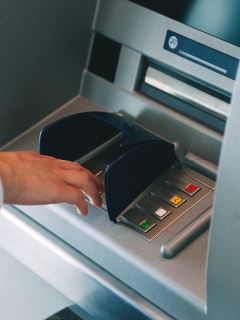CKYC Registry
-
Customer Service Contact us Service request Locate a branch
Find all the help you need
Scan the QR, get our app, and find help on your fingertips

Help CenterSupport topics, Contact us, FAQs and more
-
Login
Are you ready for an upgrade?
Login to the new experience with best features and services
-
Login
Are you ready for an upgrade?
Login to the new experience with best features and services
- Accounts
-
Deposits
IDFC FIRST Bank Deposits
View all Deposits -
Loans
IDFC FIRST Bank Loans
View all Loans - Wealth & Insure
-
Payments
IDFC FIRST Bank Payments
View all Payments -
Cards
IDFC FIRST Bank Cards
View all Cards - Blogs
- Corporate Account
-
Cash Management Services
IDFC FIRST Bank Cash Management Services
View all Cash Management Services - Supply Chain Finance
-
Corporate Lending
IDFC FIRST Bank Lending
View all -
Treasury
IDFC FIRST Bank Treasury
See more details - NBFC Financing
Support topics, Contact us, FAQs and more
- IDFC FIRST Bank Accounts
-
Savings Account
-
Corporate Salary
Account -
Senior Citizens
Savings Account -
First Power
Account -
Current Account
-
NRI Savings
Account -
TASC Institutional
Account -
Savings Account
Interest Calculator
- IDFC FIRST Bank Deposits
-
Fixed Deposit
-
Recurring Deposit
-
NRI Fixed Deposit
-
Safe Deposit Locker
-
FD Calculator
-
RD Calculator
- IDFC FIRST Bank Loans
-
Personal Loan
-
Consumer Durable
Loan -
Home Loan
-
Business Loan
-
Professional Loan
-
Education Loan
-
New Car Loan
-
Pre-owned Car Loan
-
Two Wheeler Loan
-
Pre-owned Two
Wheeler Loan -
Commercial Vehicle
Loan -
Gold Loan
-
Loan Against Property
-
Loan Against Securities
-
Easy Buy EMI card
-
Personal Loan
EMI Calculator -
Education Loan
EMI Calculator -
Home Loan
EMI Calculator
- IDFC FIRST Bank Wealth & Insure
-
FIRST Select
-
FIRST Wealth
-
FIRST Private
-
Mutual Funds
-
Sovereign Gold Bond
-
Demat Account
-
Term Insurance
-
Life Insurance
-
Health Insurance
-
General Insurance
-
Bonds
-
Loan Against
Securities -
Portfolio Management
Service
- IDFC FIRST Bank Payments
-
FASTag
-
Credit Card
Bill Payments -
UPI
-
Funds Transfer
-
Forex Services
-
Pay Loan EMI
- IDFC FIRST Bank Cards
-
Ashva :
Metal Credit Card -
Mayura :
Metal Credit Card -
FIRST Millennia
Credit Card -
FIRST Classic
Credit Card -
FIRST Select
Credit Card -
FIRST Wealth
Credit Card -
FIRST WOW!
Credit Card -
Deals
-
Debit Cards
-
Co-branded Cards
-
Credit Card
EMI Calculator -
FIRST Corporate
Credit Card -
FIRST Purchase
Credit Card -
FIRST Business
Credit Card
- Premium Metal Credit Cards
-
AshvaLifestyle1% Forex₹2,999
-
MayuraLifestyleZero Forex₹5,999
-
FIRST PrivateInvite Only
- Best for travellers
-
MayuraZero ForexMetal₹5,999
-
Ashva1% ForexMetal₹2,999
-
FIRST WOW!Zero ForexTravelLifetime Free
-
FIRST SWYPTravel OffersEMI₹499
-
FIRST Select1.99% ForexLifestyleLifetime Free
-
FIRST Wealth1.5% ForexLifestyleLifetime Free
-
Club VistaraTravelLifestyle₹4,999
-
IndiGo IDFC FIRST Dual Credit CardTravelLifestyle₹4,999
- Max benefits, Free for life
-
FIRST Classic10X RewardsShoppingNever Expiring Rewards
-
FIRST Millennia10X RewardsShoppingNever Expiring Rewards
-
FIRST Select10X RewardsLifestyle1.99% Forex
-
FIRST Wealth10X RewardsLifestyle1.5% Forex
-
FIRST WOW!RewardsTravelZero Forex
-
LIC ClassicRewardsInsuranceShopping
-
LIC SelectRewardsInsuranceShopping
- Reward Multipliers
-
AshvaLifestyleMetal₹2,999
-
MayuraLifestyleZero Forex₹5,999
-
FIRST ClassicNever Expiring RewardsShoppingLifetime Free
-
FIRST MillenniaNever Expiring RewardsShoppingLifetime Free
-
FIRST SelectNever Expiring RewardsLifestyleLifetime Free
-
FIRST WealthNever Expiring RewardsLifestyleLifetime Free
- Rewards & Credit on UPI
-
FIRST Power+FuelUPI₹499
-
FIRST PowerFuelUPI₹199
-
FIRST EA₹NVirtual1% Cashback₹499
-
FIRST DigitalVirtualUPI₹199
-
IndiGo IDFC FIRST Dual Credit CardUPITravelDual cards
- Fuel and Savings
-
FIRST PowerRewardsUPI₹199
-
FIRST Power+RewardsUPI₹499
-
LIC ClassicRewardsInsuranceShopping
-
LIC SelectRewardsInsuranceShopping
- Express and Flaunt
-
AshvaMetal1% Forex₹2,999
-
MayuraMetalZero Forex₹5,999
-
FIRST SWYPEMIOfferMAX₹499
-
FIRST MillenniaRewardsShoppingLifetime Free
- FD Backed rewarding Credit Cards for all
-
FIRST EA₹NVirtualCashback₹499
-
FIRST WOW!Zero ForexTravelLifetime Free
-
CreditPro Balance TransferTransfer & SaveReduce InterestPay Smartly
- IDFC FIRST Bank NRI Forex Solutions
-
Send money to India-Wire transfer
-
Send money to India-Digitally
-
Send money abroad
-
Max Returns FD (INR)
- IDFC FIRST Bank MSME Accounts
-
Platinum Current
Account -
Gold
Current Account -
Silver Plus
Current Account -
Merchant Multiplier
Account -
Agri Multiplier
Account -
TASC Institutional
Account -
Dynamic Current
Account -
World business
Account -
First Startup
Current Account
- IDFC FIRST Bank Business Loans
-
Business Loan
-
Professional Loan
-
Loan Against Property
-
Business Loan for Women
-
Working Capital Loan
-
Construction Equipment Loan
-
Machinery Loan
-
Healthcare Equipment Loan
- IDFC FIRST Bank Business Solutions
-
Payment Solutions
-
Tax Payments
-
Doorstep Banking
-
Point of Sale (POS)
-
Escrow Accounts
-
NACH
-
Payment Gateway
-
UPI
-
Virtual Accounts
-
As per amendment in the Income Tax Rules, PAN or Aadhaar are to be mandatorily quoted for cash deposit or withdrawal aggregating to Rupees twenty lakhs or more in a FY. Please update your PAN or Aadhaar. Kindly reach out to the Bank’s contact center on 1800 10 888 or visit the nearest IDFC FIRST Bank branch for further queries.
-
-
Most Searched
Sorry!
We couldn’t find ‘’ in our website
Here is what you can do :
- Try checking the spelling and search
- Search from below suggestions instead
- Widen your search & try a more generic keyword
Suggested
Get a Credit Card
Enjoy Zero Charges on All Commonly Used Savings Account Services
Open Account Now
When it comes to paying during shopping, a credit card outmatches the other methods of payment with its “buy now and pay later” feature. It is so designed that you have to win the trust of your bank to issue a card and allow you to borrow money on an agreement that you will repay it before the due date, along with a certain rate of interest.
With a credit card offering innumerable rewards on purchases, insurance coverage, discounts and cashback, and other benefits, it makes sense to have it. You keep getting regular access to credit as long as you do not reach the maximum credit limit.
READ MORE
Have you ever thought of how a credit card works?
A credit card has:
- The name of the bank that issued the credit card
- The type of the credit card, for instance, ‘FIRST Select’ from the IDFC FIRST Bank
- The credit card network like Visa, MasterCard, RuPay, etc.
- The cardholder’s name
- The credit card number
- The EMV chip, which hold the cardholder’s information
- The expiry date of the card
On the reverse side of the credit card, you can find:
- The magnetic stripe
- CVV security code – the three-digit number is used for online transactions
- The signature space
- The customer service contact numbers
- The hologram security feature
Now how do credit card payments work?
This can be explained with the help of an example. You are the proud holder of the FIRST Select Credit Card from IDFC FIRST Bank, and you have just finished your shopping at a store. You want to use your FIRST Select Credit Card, and here is how credit cards work:
- Step 1: Shopping is easy using a credit card in India. At the payment counter of the store, you give the bill and your FIRST Select Credit Card. The person at the counter swipes the card in the card machine or inserts it in the point of sale (POS) machine, and asks you to enter the PIN to authenticate the sale.
- Step 2: The machine sends your card’s sensitive information to the issuing bank (IDFC FIRST Bank) to verify the details such as your name, card number, validity, credit limit and PIN. If the details are correct, the bank approves the transaction.
- Step 3: On approval, the machine receives the ‘approved’ message with the bill details, and prints the same to give one copy to you.
Your bank accounts the purchases, which reduces your credit limit by that amount. The store receives the payment after a few days. The transaction is carried out safe and secured protecting the cardholder’s sensitive information.
This is how credit cards work at the store, but if you do online shopping, the procedure is different. The e-commerce website guides you through the purchases after you have chosen your product and proceed to pay using the online credit card tool. You have to choose the credit card option and the type of card, whether it is a Visa or MasterCard.
Next, you have to type in the 16-digit number, name as provided on the card, validity – month and year, and CVV. Then, you have to click on the ‘Pay’ tab to process it. Your bank receives the information and sends an OTP to your registered mobile phone number or email address to authenticate the transaction. On providing the OTP number, you get the ‘Payment successful’ message. This completes the transaction in a few minutes.
Common terms related to credit card
Getting acquainted with terms related to credit cards can help you understand their working better. Here is a quick glance at the terms related to a credit card.
- Credit limit: The maximum amount you can borrow on your credit card. It's determined by the card issuer based on your creditworthiness.
- Minimum payment or minimum amount due: The smallest amount you must pay each month to keep your credit card account in good standing. It's typically a percentage of your outstanding balance.
- Interest rate (APR): The annual percentage rate represents the cost of borrowing on your credit card. A lower APR is preferable as it results in less interest being charged.
- Grace period: The time between the purchase date and when interest starts accruing. Usually, if you pay your full balance within this period, no interest is charged.
- Statement date: The date when your credit card statement is generated, summarising your transactions and the amount due.
- Due date: The date by which you must make at least the minimum payment on your credit card balance to avoid late fees and potential credit damage.
- Credit score: A numerical representation of your creditworthiness which affects your ability to obtain credit and the terms of credit card offers.
- Credit utilisation ratio: The ratio of your credit card balances to your credit limits. Keeping this ratio low can positively impact your credit score.
- Balance transfer: Moving existing credit card debt to a new card, often with a lower interest rate.
- Cash advance: Withdrawing cash from your credit card. It usually comes with higher interest rates and fees.
- Annual fee: A yearly charge for card ownership. Some premium cards have these fees, but they often come with rewards or benefits.
How does a credit card work online?
Credit cards enable secure and convenient transactions online. When you make a purchase on the internet, you enter your card details such as the card number, expiration date, and CVV code. The online merchant sends this information to a payment gateway, which verifies the data and communicates with your bank to confirm if you have sufficient credit. If approved, the transaction is completed, and your card is charged. Online purchases offer convenience, but it's essential to use secure websites and safeguard your card information to prevent fraud. Regularly review your statements for accuracy and to detect any unauthorised charges.
How do credit card transactions work?
A credit card transaction involves multiple steps which include numerous parties like the cardholder, payment gateway, card issuing bank, and the beneficiary or merchant. The following are the detailed steps executed during credit card transactions.
1. Initiation of transaction: The process begins when you, as a cardholder, decide to make a purchase using your credit card, whether in a physical store or online.
2. Card uses: In a physical store, you present your credit card to the merchant who swipes, inserts, or taps the card in a card reader. For online transactions, you enter your card details, which include the card number, expiration date, and CVV (Card Verification Value) code on the payment page of the merchant's website.
3. Merchant verification: In both of the above-mentioned cases, the merchant sends the transaction details, including the card information and the purchase amount to their payment processor or gateway.
4. Authorisation request: The payment processor or gateway forwards the transaction details to your card issuer (e.g., a bank or credit card company).
5. Issuer verification: Your card issuer reviews the request, checking for factors such as available credit, account status, and potential fraud.
6. Authorisation response: The issuer sends an authorisation response back to the merchant via the payment processor. If approved, the response contains an authorisation code, signifying that the transaction can proceed.
7. Transaction completion: In a physical store, you complete the purchase by signing a receipt or entering your PIN. In an online setting, the website confirms the approval and the transaction is processed.
8. Funds transfer: The transaction's approved amount is transferred from your credit card account to the merchant's account, often through the payment processor.
9. Confirmation and receipt: You receive a confirmation of the transaction, either through a printed receipt in a physical store or a digital confirmation for online purchases.
10. Billing statement: The details of the transaction are recorded in your monthly credit card statement, which you receive at the end of your billing cycle.
Credit Card Statement
The transactions you conduct both offline and online are recorded in the credit card statement on the respective dates and time. The statement is generated on the 15th or 20th of every month, and it will include all the details such as your transaction details, opening balance, total amount due, current purchases, credit limit - both total and available, and payment due date.
If you want to know more about how do credit card payments work, click here
To apply for the IDFC FIRST Bank Credit Card, click here. You can apply on our website or our mobile banking app and avail a credit card without having to visit the bank.
Disclaimer
The contents of this article/infographic/picture/video are meant solely for information purposes. The contents are generic in nature and for informational purposes only. It is not a substitute for specific advice in your own circumstances. The information is subject to updation, completion, revision, verification and amendment and the same may change materially. The information is not intended for distribution or use by any person in any jurisdiction where such distribution or use would be contrary to law or regulation or would subject IDFC FIRST Bank or its affiliates to any licensing or registration requirements. IDFC FIRST Bank shall not be responsible for any direct/indirect loss or liability incurred by the reader for taking any financial decisions based on the contents and information mentioned. Please consult your financial advisor before making any financial decision.
The features, benefits and offers mentioned in the article are applicable as on the day of publication of this blog and is subject to change without notice. The contents herein are also subject to other product specific terms and conditions and any third party terms and conditions, as applicable. Please refer our website www.idfcfirstbank.com for latest updates.























